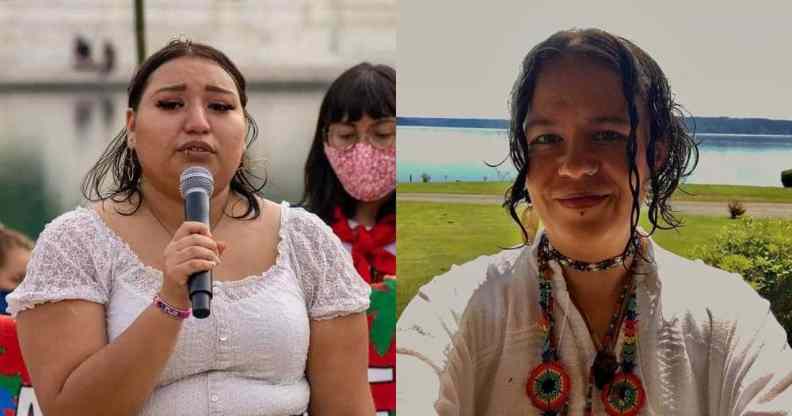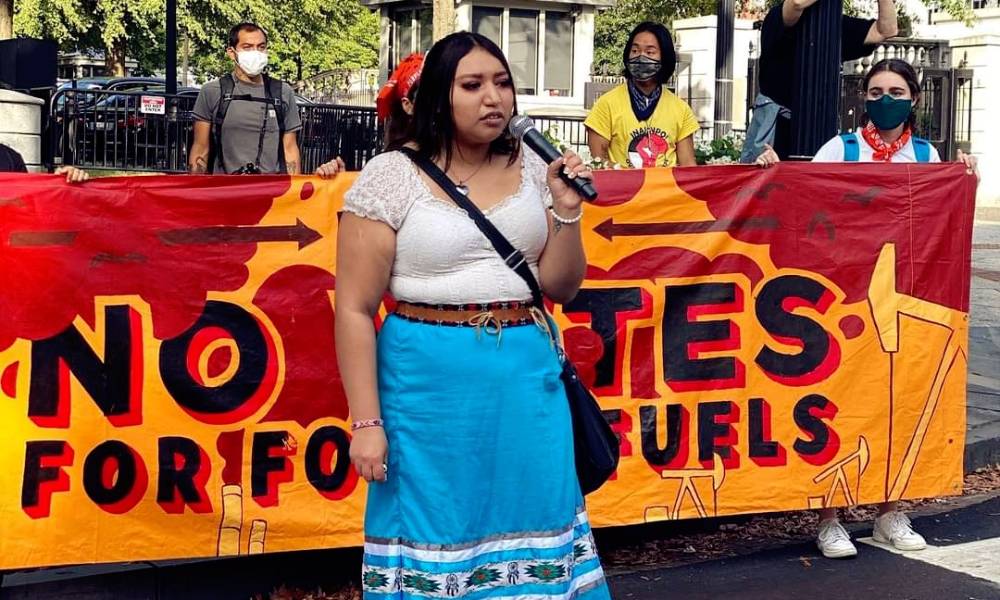Two-Spirit activists explain why the LGBT+ community needs to unite against the climate emergency

Queer Indigenous and Two-Spirit activists Morgan Brings Plenty and Zephyr Elise share how the LGBT+ community can become better stewards of the Earth. (Ron Turney/Facebook/Zephyr Elise)
Two-Spirit environmental activists have shared how LGBT+ people can use their power to fight climate change and better the planet for future generations.
Weather and climate disasters in the US took more than 500 lives and cost over $100 billion in 2021, according to the National Oceanic and Atmospheric Association (NOAA).
In February, a devastating winter storm led to deadly power outages and freezing temperatures in Texas. Judah Cohen, director of seasonal forecasting at Atmospheric and Environmental Research, told the Guardian that the storm was in “part due to climate change” and couldn’t be “hand-waved away as if it’s entirely natural”.
Morgan Brings Plenty is a Two-Spirit member of the Cheyenne River Sioux Tribe, and a social media fellow at the Indigenous Environmental Network.
They recalled blizzards hitting their home in rural South Dakota while they were growing up. As the winters progressed, they’d see snow piling up to the rooftops of buildings.
But Morgan told PinkNews the last time they saw such snowfall was when when they were “about three or four-years-old”. Last year, they only wore a light jacket for most of the winter because it was so warm, and any snowfall melted within a couple of days.
They were on a run to the Oceti Sakowin camp, a historic gathering of Indigenous Nations which peacefully protested the Dakota Access Pipeline near the Standing Rock Reservation, when they suddenly became “extremely cold” and had to “bust out my winter jacket”.
The Dakota Access Pipeline and Keystone XL have drawn mass opposition from environmental organisations and activists. They often run through Indigenous lands and the building of such monumental projects destroy wooded areas and disturb wildlife, and oil spills can ruin local water supplies.
Morgan told PinkNews they were among the “first few youths to start camping” at Standing Rock to protest the pipelines. Part of the protest involved Morgan, their family and other young people participating in the run – a physical and spiritual practice based on a traditional method in which a messenger ran a distance to communicate crucial messages to other Indigenous groups.
The history of the runs is tied back to one of their descendants who “ran from Wounded Knee for their survival”, they explained. Over the years, the runs have come to signify prayer “because we were holding one of our sacred items” and would “carry that while we’re running”.
“We’re trying to bring awareness, trying to bring a message because that is the most sacred thing that we know that has been handed down for decades, for centuries.”

Morgan grew up around environmental activism and fighting to protect their tribe’s lands. Their ancestor Crazy Horse, an Ogala Sioux chief who fought against the encroachment of white settlers on Indigenous territory, said that the “seventh generation would stand up and continue their fights”
Morgan is part of that generation, as are many of their relatives and friends, and the desire to “live up to that” inspired their protests against the pipeline.
“We’re like ‘our ancestors fought for us seven generations ago… and we’re going to fight for the next seven generations’.”
Their generation “sees how bad it is for the communities, how bad these oil infrastructures are, the fracking, the actual piplines. Because when a pipeline spills, it’s not completely cleaned up, and it gets into the water, and it can’t be cleaned up”.
They described how for their communities, that is both their drinking water as well as the water used for cattle, horses and crops.
Morgan says that their Indigenous identity, being Two-Spirit and fighting for the land all “link with each other, especially culturally wise”, as Two-Spirit people are “known for being healers” or being constricted by “gender norms” which dictate “your area” or duties.
“But it’s like we’re here, we’re going to do our thing,” they said. “We’re going to help our people, and I’ve seen a lot of Two-Spirit people out on the front line fighting together for the land.”

Morgan Brings Plenty called on the queer community and allies to use their power to create a “better world, a better life” for future generations. (Photo by Ron Turney)
The fight to protect the climate is tied to their culture because “we have always been the caretakers of the land” and have been “so connected to the land itself”.
“So when we see Mother Earth hurting, we’re hurting.”
Morgan strongly believes that everyone should be “together behind climate issues”, no matter their identity, because everyone ultimately wants a “better world, a better life” for future generations.
“Because honestly speaking, there is no other world that we can go to,” they said. “We need to take care of Mother Earth because she has given us so much through centuries, millions of years. We have to take care of her.”
Zephyr Elise was “called into this world” as a Two-Spirit to care for the planet
Zephyr is a mixed-Indigenous [Hñähñu, P’urhépecha, Wixáritari, Be’ena’ Za’a, Euskal] artist, filmmaker, animator and liberation activist. Their grandfather named them a “walker between the worlds”, and they are “either the 14th or 15th, maybe 16th, continuous generation of Two-Spirit in my family”.
“So being named as such, I was called into this world by my ancestors to do this work,” ze explained to PinkNews. “There wasn’t a moment where I said, ‘Oh hey, this is my thing’.’
“I was brought into embodiment to care for the land, to care for the water, to defend and steward and make sure there was something to pass on to the next generations.”
Ze explained that there is “no pan-Indian experience” of being Two-Spirit because there are “over 2,000 separate nations on this continent”. There are as “many traditions in however they called their Two-Spirits” and “there are as many ways to be Two-Spirit” as there are “individual Two-Spirits”.
When Zephyr arrived at Standing Rock, there was a “huge presence” and a “huge leadership” of Two-Spirit people. They explained it is traditional that Two-Spirit people would be “in the war camps” and helping to “plan both the action and then the recovery afterwards”.
“Because it’s Two-Spirit people, we have to think about what are the consequences,” ze said. “As healers, as the people who kept all of those knowledges, we were also going to be the ones who were called to bring life into this world and often to help people transition out, and then all the healing in between those two points of life.”
Zephyr said ze was “very much an accidental activist” because ze has a “spiritual role” as well as “physical responsibilities” within the community. Ze has “always felt more like I have lived life being called by spirit”.
“Wherever spirits and ancestors ask me to go or asked me to do something, that’s the work I’ve done,” Zephyr said.
Being “born into this role of being a guardian” informed their world view and impacted every aspect of their life: it’s “not a single focus of a single issue or single trajectory”.
Instead, Zephyr described it as “really having to look at the whole picture of the whole planet” and realising that “we still have work to do” if the planet isn’t “balanced”.
Ze told PinkNews a stark example of this imbalance was when a heat dome hit last summer the area ze lives in, and the “shellfish just boiled in the water“.
“We’re talking millions of life forms,” Zephyr said. “That impacts both commercial industry and impacts a lot of our native people.”
They continued: “Anyone who relies on the waters to get their sustenance or their economic support are really facing the impacts of long hot summers, the impacts of the rising ocean temperature and the changing of the pH.
“It’s even making it hard for a lot of the oysters and the shellfish to form.
“The elders will talk about how abundant all of the life was. The fish runs that were so widespread that you could walk across the salmon trying to get up the river zone.
“Now, it’s one or two.”
Zephyr has been focusing a lot of their attention on a film for Lorax Coalition – an intergenerational group of local Mason Country residents living on the traditional territories of the Skokomish and Squaxin Island Nations that are fighting for the environment – as well as the Mason County Climate Justice (MCCJ), a group they co-founded with their partner.
As part of MCCJ, ze, who is also a regenerative farmer, has gone to prisons and talked about sustainable soil practices to “teach the guys on the inside” regenerative environmental practices they can “use both for gardening but also for their other lives”.
Through their work bringing people together to fight for a common goal, they stress the importance of all people standing up collectively for the good of the planet. They warned there will be no opportunity for “these beautiful identities” that the LGBT+ community holds “without a full planet to hold us”.
“We have to put a primary focus of all liberation [on the planet], that is the only one that sustains us,” Zephyr said.
“It is the beauty of the resilience of the queerness – finding ways through when a path doesn’t seem possible; when an identity doesn’t seem possible; when happiness and love don’t seem possible.”

